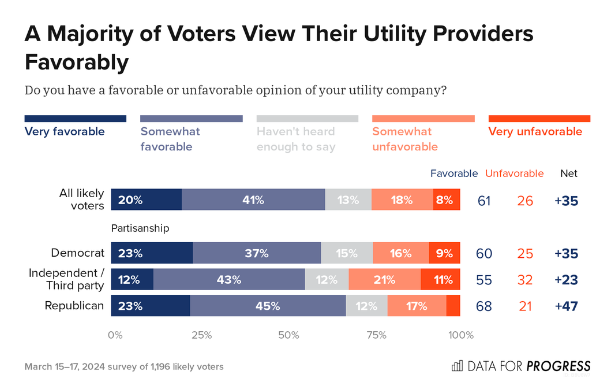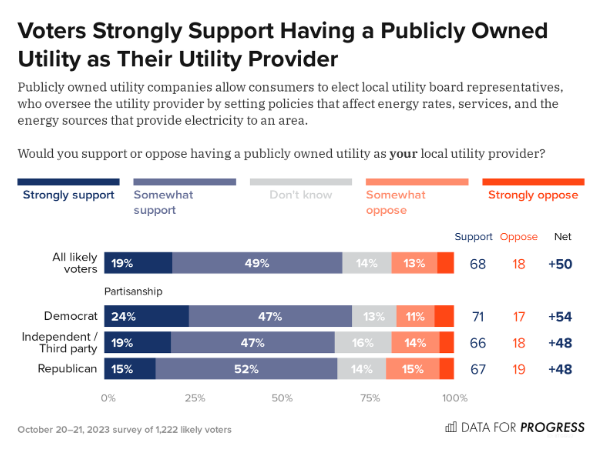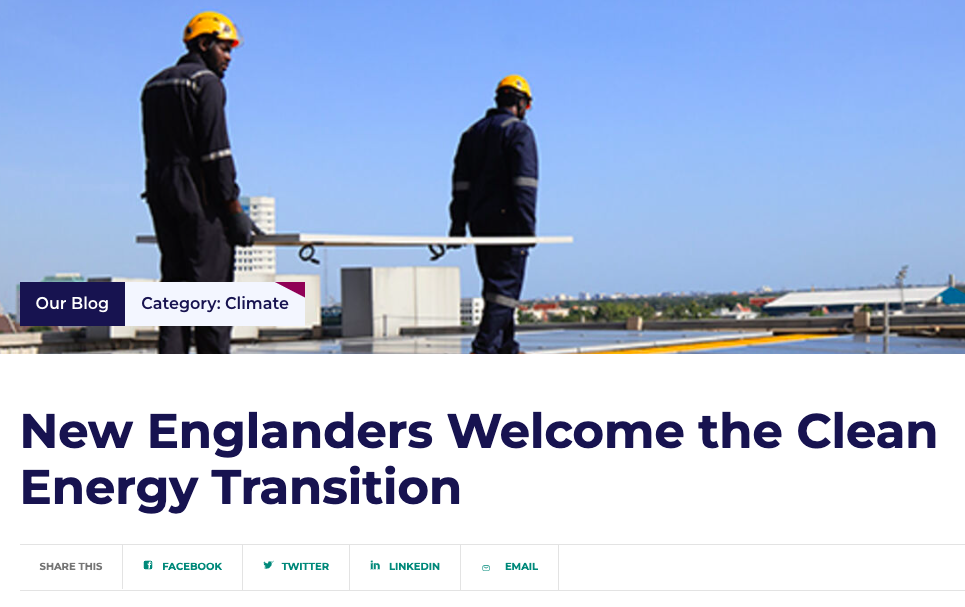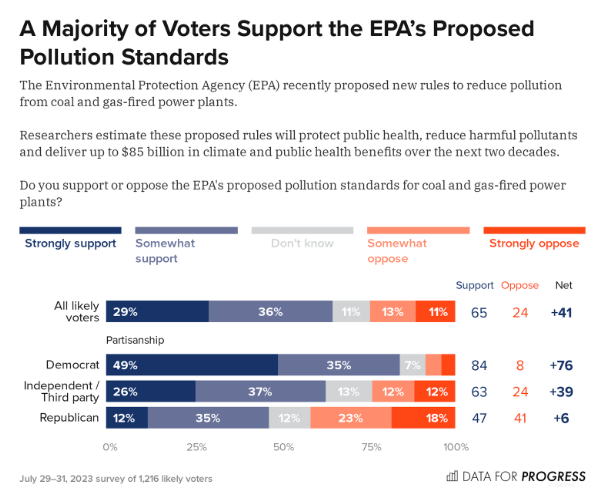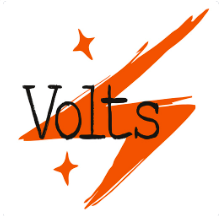Resources
Search below for resources covering the intersection of climate engagement, social science and data analytics.
RESULTS
Environmental Polling Roundup - March 29th, 2024
This post includes climate and environment headlines, data points, and key takeaways from recent public polls - including new polling and research on the EPA's vehicle emissions rules, utilities, and people’s emotional responses to climate change.
HEADLINES
Poll: Voters Strongly Support Banning Utility Junk Fees and Using Ratepayer Funds for Political Activities
Voters mostly like their utility companies, but overwhelmingly oppose junk fees and utilities using customers’ money to fund lobbying and political activities. 72% of voters support legislation to prevent utility providers from using money collected from customers’ monthly bills to fund political activities. Support for this proposal is very balanced across party lines, with 74% of Democrats, 72% of independents, and 69% of Republicans in favor of legislation that would ban utility companies from using customers’ money on political activities.
WSP Energy Future Report: Electric Grid Reliability Worries Americans
Americans are widely concerned about aging and unreliable electric grid infrastructure. Grid reliability, along with health and jobs, is a key argument in favor of transitioning to clean energy.
Poll: Putting the "Public" in Power: Voters Support Having a Publicly Owned Utility
Two-thirds of voters say that they would support having a publicly owned utility as their electricity provider; having a say over electricity rates is the biggest perceived benefit. A strong majority of likely voters nationwide (68%) support having a publicly owned utility as their local utility provider. Support holds across party lines, with majority support among Democrats (71%), Independents (66%), and Republicans (67%). A majority of voters (60%) report that their utility bills increased in the last year. When asked, a plurality of voters (39%) want their utility company’s top priority to be lowering prices for consumers. Voters also want their utility to prioritize ensuring reliable service (21%), upgrading aging grid infrastructure (17%), and transitioning to renewable energy (15%).
New Englanders Welcome the Clean Energy Transition
Recent focus groups underscore widespread enthusiasm for clean energy and urgency for electrification in New England. In the summer of 2023, Barr Foundation sponsored six focus groups with homeowners in each New England state and a final group with renters to gain further insights. They were particularly interested in discussing electrification, which has become a central part of climate strategies in the region. In alignment with the climate poll, respondents had an overwhelmingly positive perception of clean energy, but they also had questions about implementation, the costs of the energy transition, and how their own lives might change in the future. Many respondents viewed the clean energy transition as inevitable; they encouraged incentives and policies at the state and federal level that further clean energy development. A factor which gave participants pause was grid reliability; participants were concerned about the ability of the electric system to handle the transition of the power supply and the addition of many heat pumps and electric vehicles. Residents’ hesitation to adopt clean technologies is tied to costs, and most are unaware of incentives that are already available to them (or will be soon). People like heat pumps (once they know what they are). Rooftop solar is considered a luxury. Participants like the idea of clean heat standards+.
Poll: Voters Support the EPA’s Proposed Rules on Coal- and Gas-Fired Power Plants
Voters support stronger EPA rules on power plant pollution and want their local utility companies to prioritize clean energy over fossil fuels. Voters support the EPA’s proposed new power plant pollution rules by a 65%-24% margin after reading a brief description of them. 76% of voters disapprove of utility companies using money collected from consumers’ bills to fund political activities like lobbying. By a 59%-33% margin, voters say that their local utility company should prioritize clean energy like wind and solar over fossil fuel energy like coal, oil, and gas. 54% of voters say that their local utility company should support the EPA’s proposed new power plant pollution rules.
You Can Win Bold Climate Laws in Your State
New York State passed the Build Public Renewables Act in May 2023. In this resource, Olúfẹ́mi O. Táíwò spoke with three organizers from the NYC-DSA Ecosocialist Working Group who campaigned for the legislation. Socialists in New York City spearheaded the Build Public Renewables Act (BPRA) to authorize and mandate the public power authority, the New York Power Authority (NYPA), to build, develop, and own renewable energy in the state to meet the climate goals set in 2019 to decarbonize the state’s energy system. DSA also wanted to create discounted utility rates for low- to moderate-income communities because people are struggling to pay their energy bills, as well as close down all of NYPA’s gas peaker plants, which are primarily located in Black and brown neighborhoods. The campaign built relationships with environmental justice organizations like WE ACT, other DSA chapters, groups like Sane Energy Project, For the Many, Food & Water Watch, and Sunrise NYC—and it was tougher to power map to get labor unions to support the bill and get it over the finish line. DSA-endorsed legislators were crucial to pushing the policy inside the state legislature. This long-form interview includes many other descriptions of the campaign.
It's up to states to implement IRA. Are they ready?
States don’t (yet) have the administrative capacity to smoothly implement the ambitious policies in the IRA; in this episode, policy strategist Sam Ricketts of Evergreen Action discusses how federal programs can help them get there. Nobody is better positioned than Ricketts to address the issue of state readiness. He played a key role in Jay Inslee's pathbreaking presidential campaign, which was built off of successful policies in Washington and other states. Then, as senior strategist for Evergreen Action, a nonprofit he founded with other Inslee veterans, he helped shape the ambitious trio of bills the Democrats have passed in the last year and a half: the Infrastructure Investment and Jobs Act, the CHIPS act, and the Inflation Reduction Act (or as advocates fondly refer to them, Uncles Bill, Chip, and Ira). Now he’s working with Evergreen and the Center for American Progress to educate and prepare state and local lawmakers for the post-IRA world.
Pushing for Energy Justice with Fairbanks Climate Action Coalition: Community Organizing Lessons from Alaska
The Fairbanks Climate Action Coalition (FCAC) is working to advance a Just Transition away from fossil fuel extraction and towards renewable energy and a regenerative economy in interior Alaska. For several years, FCAC’s Renewable Energy Working Group has been organizing around their local electric utility cooperative, Golden Valley Electric Association (GVEA), to support more generation from renewable energy sources and energy justice initiatives and decarbonization of electricity. FCAC’s organizing efforts have supported more pro-renewable candidates to be democratically elected to the GVEA’s Board of Directors and pushed the utility to consider community solar projects and on-bill financing. A major win came in June 2022 when the GVEA Board adopted a strategic generation plan including a commitment to close down one of their coal plants and pursue a large scale wind power project.
In this webinar, FCAC shares learnings from their Microgrant Report: Cooperative Opportunity: Clean Energy documenting the development of their campaign, sharing reflections on how their organizing structure led to wins, the challenges they faced, and the lessons that can be learned to succeed in future campaigns.
The Fossil Fuel Industry’s Own Poll Found Most New Yorkers Support a Gas Ban in New Buildings
Polling commissioned by oil and gas companies shows that New Yorkers support climate action and want to phase out residential gas. 74% of New Yorkers support the state “aggressively moving to reduce greenhouse gas emissions”. 65% of New Yorkers support the goal of having 1 to 2 million New York homes heated with electric heat pumps rather than natural gas or oil-fueled furnaces by 2030. 65% of New Yorkers support the goal of electrifying 85% of New York homes and commercial buildings with electric heat pumps by 2050.
Pagination
- Page 1
- Next page
